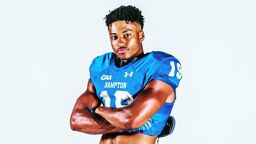Conner Mertens, the Willamette University football team's up-and-coming kicker, had asked head coach Glen Fowles for some office time last Monday to discuss something important. Fowles has been on the team's staff for 18 years. He's moved up the ranks from offensive line coach to offensive coordinator and a year ago was named the team's head coach. Before that he played on the offensive line for the Bearcats for two seasons.
In his two decades at Willamette, an hour south of Portland, Ore., he's never had to handle anything like this.
Fowles and his special teams coordinator feared Mertens would tell them he was transferring to another school. While Mertens is a red-shirt freshman and missed the 2013 season due to injury, he has the potential to be the team's place kicker for the next four years. It would be a tough loss for the team.
When Mertens arrived for the meeting, Fowles started a subtle soft-sell on the school. Willamette offered great opportunities, the personnel was top-notch, the academics were stellar and Mertens' future with the team was bright. Mertens laughed.
"I'm not going anywhere, coach," Mertens said.
That was a relief.
Mertens asked Fowles if he was a good kicker. Fowles confirmed. He then asked if his role on the team would be affected by things he did off the field, or if he'd be judged by his performance. All that mattered to Fowles was whether he could kick that ball through those two goal posts. That was reassuring, Mertens said, because he had something very personal to share with his coach.
"I'm bisexual," Mertens told Fowles. "I like dudes. I have a boyfriend. And next week, I'm going to tell the world."
Mertens didn't easily arrive at his decision to come out to his coach or team, let alone publicly. No college football player in the United States at any level has ever come out publicly while still playing. Some have come out to their team, many have come out to friends, but none have said publicly that they are LGBT.
As a red-shirt freshman, Mertens hasn't played a down for Willamette. With no college experience under his belt and the starting place-kicker position for next season up in the air, it would be easy for a coach to find ways to bury him on the depth chart and quietly push him off the team.
He was taking a big risk. Yet for Mertens, the potential gain for both himself and other youth like him simply outweighed the risk.
"For me growing up, I always felt the biggest thing that caused my depression was the feeling of being alone," Mertens said. "I hate the stereotypes that go along with liking the same sex. You don't have to follow the stereotype to be this way. I made the decision that if I could help anyone else avoid feeling the way I felt, I would."
The people he most wanted to reach are the residents of his hometown of Kennewick, Wash. The Tri-Cities is a conservative area in Southeast Washington that Mertens said isn't the most LGBT-friendly place in the world. Barack Obama garnered just 35% of the vote in the area in 2012; 63% voted against the state's ultimately approved same-sex marriage ballot measure in the same election.
There were some students in his high school who either came out or were known to be gay. Those youth, Mertens said, plummeted to the bottom of the school's social ladder as soon as they bore the label "gay." As it is in many grade schools, hearing gay slurs was a daily occurrence.
"It's not directed at gays, it's just more like if guys are giving each other crap, it's never that you're stupid, it's always that you're a 'fag' or a 'cocksucker.'"
Mertens was never the target of homophobia. He happily dated girls and never let on that he had a secret, yet inside he knew he also had an attraction to other boys. Despite being a successful football player, he feared losing his friends and teammates if he talked about his homosexual tendencies.
"I had a smile on my face all the time as a kid, but I was dying on the inside. In my hometown, you have to fit in or you'll be exiled. If somebody had come out that I looked up to in the town, I would have been a lot happier.
Mertens doesn't want any other youth in his hometown to ever feel the way he did, so he took matters into his own hands. Last night he tweeted a lengthy letter to his hometown in hopes of changing hearts and minds and giving local LGBT youth someone they can point to with pride:
"You are not alone. You do not need to come out but you do need to know that you do not have to go at this by yourself. The aloneness you're feeling is temporary and it will get better. This place is changing…changing for the better. I made the decision that if I could prevent one person from feeling that self-hatred, loneliness, desperation and a thousand other emotions that I felt, I would. I will be damned if I let anyone tell you that you are wrong or weird or not normal.
"Love yourself and allow others to love you. Be who you are and know you're not alone."
Football in our culture has an aura like no other. Fans and players celebrate hard hits like a boxing match, masculine bravado like a scene from 300. Fans have even been known to celebrate injuries, as they did when Houston Texans quarterback Matt Schaub tore ligaments in his ankle last October.
"It's always been the football community that scared me the most when I've thought about coming out," Mertens said.
It's a community he's been a part of for years. In high school he played offense, defense and special teams, a starter or second-string in every phase of the game. Nothing happened on the team – in or outside the locker room – that Mertens didn't hear about.
"I've been around athletes all my life. I've heard the stuff we say. I say ‘we' because I'm not going to lie, I contributed to it when I was younger. I made fun of guys by calling them ‘gay' or ‘homo' or ‘queer.' So I've always assumed because everyone wants to be masculine, and because they see being gay as a weakness, they'd label me that and not give me a fair shot on the field."
It's no coincidence that Mertens ended up at Willamette despite better offers elsewhere. The Willamette Bearcats football team is no stranger to ground-breaking inclusion. On Oct. 18, 1997, the Bearcats became the first college football team to have a female participate in a game and score a point. Like Mertens, Liz Heaston was a kicker. She recorded two successful points after touchdown that day as the Bearcats beat Linfield College, 27-0. That team advanced to the NAIA national championship game, moving to the NCAA the following year.
"On any sports team it's all about the culture, and the culture is made by team leaders and coaches," Dr. Liz Heaston Thompson said yesterday. "When you have great leaders, you're able to do great things. I think in that type of culture like Willamette has, you're lucky to be in that kind of situation to just be the best you can be. And that's the culture I found there."
While Fowles was only an assistant coach during Heaston's playing days, he took a lot of pride in having her as part of the team. He called it a "badge of honor around here" and had nothing but glowing things to say about the former kicker. Respecting diversity is a big deal for Fowles.
"Sports is a wonderful thing," he said. "Whether you're black, white, blue, green, it doesn't matter. If you can help the team, it doesn't matter."
While many football programs are dominated by Christian religious doctrine, Fowles and his predecessors have created an atmosphere that is tolerant of all people and religions and that focuses on building virtuous people, not just turf-stomping Christians like Ron Brown at Nebraska.
Doing right, carrying yourself with honor, demonstrating strong character, respect for others, the value and importance of sacrifice and the role of forgiveness in life: These are the virtues Fowles has instilled in the team.
"We are not faith-based, we are virtue-based," Fowles said. "We talk about virtue having the ability to transcend any religion. The biggest chunk of our guys are Christian athletes and belong to the Fellowship of Christian Athletes. But we also have other religions on our team and those guys believe in the same virtues. We don't designate a faith for our team, but we live by certain virtues that transcend religions."
While Christianity doesn't dictate the culture of the Willamette football team, it has played a dominant role in Mertens' life. Growing up in a devout Catholic household and educated in a private Catholic school until ninth grade, his faith in Christ is an important part of his character and his life. His Twitter handle features the Bible passage Joshua 1:9:
"Be strong and courageous. Do not be afraid; do not be discouraged, for the Lord your God will be with you wherever you go."
Since his sophomore year in high school, Mertens has channeled much of his Christian faith into his work with Young Life, a national organization that gives Christian adults the platform to preach the word of God to youth.
"Young Life helped change my life around. I was getting into trouble when I was a freshman in high school, but with Young Life I started doing good in the local area. My Young Life leaders taught me how to be a man, the importance of servitude and putting others before yourself and generally how to be a loving person."
When he left high school, Mertens began training as a Young Life adult leader. Local chapters near Willamette recruited him to be part of their efforts. It was perfect. Mertens wanted nothing more than to give back to the organization that had helped him become the person he is today and help shape other youth.
When friends and family asked him what he wanted to do with the rest of his life, he wouldn't be able to tell them what career path he'd take or where he'd live, but he'd always tell them he'd be a part of Young Life for the rest of his days.
That is now impossible.
Young Life's "Faith and Conduct Policies" address what the organization calls "sexual misconduct." The policies strictly forbid any LGBT person from being a staff member or volunteer for the organization:
"We do not in any way wish to exclude persons who engage in sexual misconduct or who practice a homosexual lifestyle from being recipients of ministry of God's grace and mercy as expressed in Jesus Christ. We do, however, believe that such persons are not to serve as staff or volunteers in the mission and work of Young Life."
It wasn't until late last year that Mertens read those words. He had long suspected there was some reference to homosexuality, but reading the outright ban sent him into a mini depression. He remembered crawling into bed after absorbing the words that ended his relationship with Young Life and lying there for the entire day.
By simply coming out publicly to help other LGBT youth – with the highest youth suicide rate in the nation – he was instantly banned from the very organization that helped him get to this point.
"It kind of broke my heart. The only word to describe how I felt was ‘numb.' I always thought it could happen, that this was probably a rule they had. Young Life has made me the happiest person, and I had so many plans for my work with them. There is so much good I could do with Young Life. I replay all the memories I have and all that I learned, and now I realize I won't be able to give back to the kids. It kind of sucks.
"I guess one door closes, another opens."
There are no such rules in sports. While we've been told for decades that gay men can't play football, the facts tell us otherwise. Various former college football players – including Middle Tennessee State kicker Alan Gendreau and Bloomsberg University captain Brian Sims – have been out to much of their teams, though not the public, while playing.
No men's American pro-sports league has had more former players come out publicly as gay than the NFL. Various members of the 1993 Houston Oilers, including Hall of Fame quarterback Warren Moon, said they had at least two gay teammates and the players didn't care. Just last week, the NFL Network aired an episode of A Football Life dedicated to gay former Washington Redskins Pro Bowler Jerry Smith, whose NFL record for touchdowns by a tight end (60) stood for 26 years.
Yet none of them have ever come out publicly while active.
Sitting there in coach Fowles' office, Mertens represented a first.
While some will dismiss the story because he's a Div. III kicker, and others will pooh-pooh it because he's bisexual, no one has ever done what he's doing by telling his story. No college football player before him has stepped out into the public as an out man in hopes of inspiring youth to be themselves.
In a lot of ways, Mertens' situation — redshirt freshman kicker — make this story that much more powerful. His situation made the move as risky as it could be: For the players and coaches, he could easily be viewed as dispensable. Instead, they are embracing him.
"Coach didn't blink an eye," Mertens said of his revelation. "He talked about how they don't build football players at Willamette, they build men, and that he was proud that I could tell him this about myself."
Few football coaches prepare for the day when one of their players comes out to them. Fowles hadn't seen it coming, but he embraced it with pride.
"You never expect that conversation to happen," Fowles said. "Typically when people do things like this, it's to their family and closest friends. Heaven forbid someone should try to do it while they're a competitive athlete. They just don't do that very often. But Conner has friends here and he feels comfortable telling us, and I think that speaks well of our program. He feels safe and well-liked and comfortable around us."
Late last week, Fowles had a meeting with 16 team leaders. They discussed various issues with the team, and at the end of the meeting Fowles let them know about Mertens' impending public revelation.
It was uncharted territory for Fowles, who had never addressed the issue of sexual orientation with the team. While the NCAA last year released a primer for coaches on how to address these issues, Fowles had never heard of it. "There isn't a manual for this kind of stuff," he said.
Fowles did the best he could. He told the team leaders that Mertens is coming out publicly, that it's important to him to do so, and he let them read the letter Mertens intended to post to his hometown. There was a moment of silence in the room … followed by a parade. One by one the players stood up and voiced their love and appreciation for Mertens.
"It was unwavering support," Fowles said. "They were supportive because he's one of their teammates. It was impressive. After that meeting I congratulated the coaches for recruiting good men. We've got something special here. I was so proud of those guys. If that's the future of young men in America, we've got a shot. It was awesome."
Kyle Shaver was in the meeting. The freshman outside linebacker has already been named to the team's leadership council, starting four games as a freshman and recording a sack last season. He was shocked by the news. Mertens was "the last guy you'd expect" to be anything but straight. That didn't stop him from fully embracing his teammate.
"Football as a sport, it doesn't matter if you're gay or straight or bisexual or what your background is," Shaver told Outsports. "The sport doesn't discriminate. As long as you're willing to get on the field and in the weight room and in the film room and give 100%, it doesn't matter to us who you are. Conner's a Bearcat. Whether he's gay, bisexual or straight, he's one of us."
Other team leaders followed with text messages to Mertens:
The support of the coaching staff and the leadership council secure, they decided to tell the entire team. It was Mertens' biggest concern. Players on the team come from various backgrounds and religions. They represent every corner of the West Coast from big cities like Los Angeles and Seattle to small, rural towns like Eagle, Idaho, and Lone Tree, Colo. There was no way to know how they would react to the news.
While Mertens was worried, Shaver was confident. He knew times had changed, and that he culture of the team wouldn't let any differences develop fissures in the team unity.
"And those who aren't OK with it are going to have to keep that internalized because we're not going to accept any kind of homophobia on the team," Shaver said.
Still, Fowles wanted to handle it correctly. Former NFL player Wade Davis, who now runs the You Can Play project, advised Fowles on how to best address the team. Davis hopped on a plane Monday morning and was with the team for the revelation about Mertens and the ensuing conversation.
The meeting happened last night at 7:30pm. Mertens stayed away, allowing the guys to share their feelings without having to worry about his feelings. The team filed into a room and sat at desks bearing pieces of paper turned upside down. At the same time each player turned over the piece of paper to read Mertens' letter to his hometown.
This is what they read:
"They were all silent the whole time," Davis said. "It was cool. They all respected every word in that letter."
When they were done, Davis told some jokes to lighten the mood and to make sure each of the guys knew they didn't have to tip-toe around the subject. Mertens was still just a member of the team and teasing him about his sex life was still fair game. It worked.
One by one the players shared what was on their minds. Every one of the team members who spoke shared the same sentiment: Mertens is a member of the team, he has a bright future on the gridiron, and it just doesn't matter if he has a boyfriend or a girlfriend.
"It's been insanely incredible," Mertens said a couple hours after the meeting last night. Text messages and phone calls poured in from the team, all offering their love and support. "I'm speechless. That is the only word I can use to describe this. Even a lot of the guys on the football team I was most scared of are the ones who have been the most amazing."
One of them asked Mertens to meet him on campus. When he arrived, the player gave his kicker a warm embrace.
"I love you man," the player said. "This doesn't change anything."
Last Sunday Mertens was dancing with a couple girls at a party. Two of his teammates high-fived him and asked if he was going to take one of them home. While he didn't say it, all he could think was, "My boyfriend wouldn't like that too much."
He won't have to dance around those questions again. Mertens can now merge two important corners of his world: His personal life and his football life. For the last seven months he's been dating a college baseball player whom he's never mentioned to any teammates. That has already changed. With Valentine's Day around the corner, a meeting between the two discrete parts of Mertens' life could even be in the works.
As the new year swings into full gear, Mertens now has his eye on spring football. The team's starting kicker is graduating this spring and replacing him is an open competition. Mertens has a starting position to win, and he intends to earn it.
"He's good," Fowles said. "He can kick the ball. When the kicking duties are up for grabs, he'll be one of two guys competing for that starting job."
Fowles said Mertens' sexual orientation will have nothing to do with his shot at the starting place-kicker position. The position is unique in football in that there aren't many intangibles to finding a good kicker: Either he can send kickoffs into the end zone and hit 45-yard field goals or he can't. Mertens' future with the team rests entirely on his leg.
"With kickers, it's painstakingly obvious who should be kicking for you," Fowles said. "It's kind of like track and field with distance and times. With kickers it's really easy to see who has the best leg, who kicks the farthest and who can hit a 30-yard field goal consistently. His sexual orientation has nothing to do with any of those things. If he's the best guy, he'll get the job."
Football won't be the only sports focus for Mertens. He intends to break down barriers for LGBT athletes however he can. He has heard of far too many gay people leaving sports because they felt like they didn't belong, or they heard too many homophobic comments. Mertens wants to be part of the solution.
"It makes me so sad because football has always been my way of getting away from life for a little bit. It's my therapy. And the idea of someone quitting something they love because of their sexual orientation makes me mad."
Young Life's loss is now the gain of every young LGBT athlete in America.
Before he comes out to anyone, Mertens always listens to Sara Bareilles' Grammy-nominated song, "Brave." He has had the song on repeat for the last two weeks. The lyrics of the song that has kept Mertens' ipod working overtime are, by no coincidence, fitting:
Say what you wanna say
And let the words fall out
Honestly I wanna see you be brave
And since your history of silence
Won't do you any good,
Did you think it would?
Let your words be anything but empty
Why don't you tell them the truth?
Mertens can now take the song off of repeat.
You can find Conner Mertens on Twitter @ConnerMertens. You can also email him at [email protected].
If you're an athlete who would like to tell your story on Otusports, you can find Cyd Zeigler on Twitter @CydZeigler and via email at [email protected]. Outsports is on Twitter @Outsports.











































